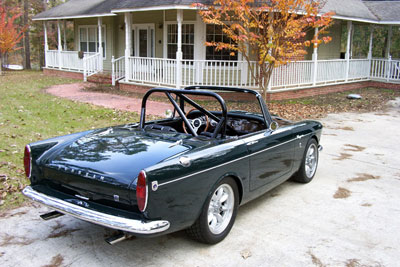Selecting a Professsional Restoration Shop - Lessons Learned
An article by Stephen Waybright
August, 2002

My Tiger passed through 3 different restoration shops over a span of five and a half years in the course of a complete restoration to non-stock specification; from Rochester, NY (too slow), through San Antonio,TX (too costly), to San Bernardino, CA (close to just right). The final result represents both the car of my dreams, and many restoration nightmares. If you are planning to have a car restored, I hope these lessons learned will help you avoid the nightmares. Feel free to contact me, with any questions you have about what is posted below.
General Advice

Buy the best, fully restored car you can afford, instead of restoring one yourself.
 You will save big $$$ compared to funding a restoration. Even if you do most the restoration labor yourself, the parts & material costs alone can approach or even surpass the cost of a previously restored car. If you heed this advice, you can ignore everything that follows.
You will save big $$$ compared to funding a restoration. Even if you do most the restoration labor yourself, the parts & material costs alone can approach or even surpass the cost of a previously restored car. If you heed this advice, you can ignore everything that follows.

If spending 2X your intended budget is cause for deep regret, consider the advice immediately above once more. I don't know anyone who has spent less than 1.5X their intended budget for a complete restoration, and only one that was under 2X the original plan. My Tiger landed more than 3X the original "Max" budget. I could have bought 3 fully restored Tigers (or equivalent) instead for that kind of money!
 Talk to anyone you can that has had a car restored about their costs and lessons learned.
Talk to anyone you can that has had a car restored about their costs and lessons learned.
 Read books on car restoration:
Read books on car restoration:
 "How to Restore Your Collector Car" by Tom Brownell
"How to Restore Your Collector Car" by Tom Brownell
Screening Restoration Shops
 Find a shop familiar with your car make & model.
Find a shop familiar with your car make & model.
 Especially critical with rare cars.
Especially critical with rare cars.
 Shops can learn the details to restore any car, but do you want to be the one that pays for their education, on top of the restoration itself. This will likely save multiple thousands $$$ in the long run. Compared to other shops, they should:
Shops can learn the details to restore any car, but do you want to be the one that pays for their education, on top of the restoration itself. This will likely save multiple thousands $$$ in the long run. Compared to other shops, they should:
 Know the best sources for quality parts at the best prices, especially hard to find parts.
Know the best sources for quality parts at the best prices, especially hard to find parts.
 Be most efficient in disassembly, repair techniques and reassembly.
Be most efficient in disassembly, repair techniques and reassembly.
 Know problem areas of the original design that may warrant upgrading, and what things not to disturb.
Know problem areas of the original design that may warrant upgrading, and what things not to disturb.
 Be able to provide, by far, the most accurate cost and schedule estimates (though you should still expect major overruns).
Be able to provide, by far, the most accurate cost and schedule estimates (though you should still expect major overruns).
 Get customer references
Get customer references
 Viewing copies of customer testimonials are worthless. They could be relatives for all you know. At the very least they may be from folks with no real concerns over cost or time. You must talk to references 1st hand.
Viewing copies of customer testimonials are worthless. They could be relatives for all you know. At the very least they may be from folks with no real concerns over cost or time. You must talk to references 1st hand.
 If refused, assume they're hiding something and go elsewhere. Accept no excuses:
If refused, assume they're hiding something and go elsewhere. Accept no excuses:
 Client confidentiality: If they can't find a couple customers happy enough with the experience to "reveal" themselves and talk to you, ask yourself why that might be.
Client confidentiality: If they can't find a couple customers happy enough with the experience to "reveal" themselves and talk to you, ask yourself why that might be.
 Every project is different: So what... you need to know what it's like to work with this shop. The fact that every project is different reinforces why you should try to talk with multiple customer references.
Every project is different: So what... you need to know what it's like to work with this shop. The fact that every project is different reinforces why you should try to talk with multiple customer references.
 Ask one or two past customers & one current customer, with as similar a project as possible:
Ask one or two past customers & one current customer, with as similar a project as possible:
 Would you go to the same shop if you could do it over?
Would you go to the same shop if you could do it over?
 In hindsight, how good was the guidance provided in making budget trade-off decisions?
In hindsight, how good was the guidance provided in making budget trade-off decisions?
 How did the final total cost compare to your original expectations?
How did the final total cost compare to your original expectations?
 How accurate were the schedule & cost estimates?
How accurate were the schedule & cost estimates?
 Were project updates provided in a timely manner, including schedule and cost revisions?
Were project updates provided in a timely manner, including schedule and cost revisions?
 How good was overall correspondence? (very important if not local)
How good was overall correspondence? (very important if not local)
 What are the worst problems encountered during or since the restoration? Have they stood behind their work and helped you resolve any concerns?
What are the worst problems encountered during or since the restoration? Have they stood behind their work and helped you resolve any concerns?
 Get cost and schedule estimates in writing.
Get cost and schedule estimates in writing.
 If they want your business they should be willing to draw from their experience to help you understand the financial implications of such an undertaking.
If they want your business they should be willing to draw from their experience to help you understand the financial implications of such an undertaking.
 Expect revisions (increases) to the estimate as the project proceeds, up to 2X very likely, 3X increases or more are quite possible. See my first note about buying a fully restored car in the first place.
Expect revisions (increases) to the estimate as the project proceeds, up to 2X very likely, 3X increases or more are quite possible. See my first note about buying a fully restored car in the first place.
 Once disassembly and stripping are complete, you should be able to get a more accurate, updated estimate of the work to be performed, the parts to be replaced and those to be restored.
Once disassembly and stripping are complete, you should be able to get a more accurate, updated estimate of the work to be performed, the parts to be replaced and those to be restored.
 They're the experts, not you, they should have a clue for most normal restorations, especially after disassembly and stripping are complete. Do you really want them operating with no budgetary accountability whatsoever? That sends the wrong message: that cost is no object and they are being commissioned to proceed as such.
They're the experts, not you, they should have a clue for most normal restorations, especially after disassembly and stripping are complete. Do you really want them operating with no budgetary accountability whatsoever? That sends the wrong message: that cost is no object and they are being commissioned to proceed as such.
 Be prepared to pull the project at the first sign that you're not happy with how things are progressing, on either a cost or schedule basis. It's not likely that things will get better and they could get a whole lot worse.
Be prepared to pull the project at the first sign that you're not happy with how things are progressing, on either a cost or schedule basis. It's not likely that things will get better and they could get a whole lot worse.
Good Tiger Motoring,
Stephen Waybright
Editors Note: Stephen Waybright has put a lot of work, including some pretty nice upgrades, into his effort. Visit his web site 

|
Anyone who would like to contribute to this effort should contact us at Editor E-Mail. Thank you. |
 **
**

